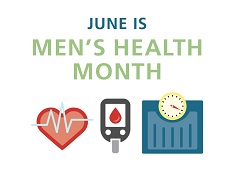By: Urology Care Foundation | Posted on: 12 Jun 2019

Did you know June is Men's Health Month? This is the time to raise extra awareness and promote facts to men around the world. Education, early detection and regular check-ups could save lives with so many preventable health issues facing men.
The Urology Care Foundation has a host of reliable resources for men to get facts about their health. It's important to spread awareness about men's health issues and it's vital to speak up if you or a loved one suspects they have a problem.
Key Men's Health Facts
- In the U.S., about 1 in 9 men will be diagnosed with prostate cancer in their lifetime.
- With timely diagnosis, testicular cancer is most likely treatable and most often curable. It is the most common cancer in men 15 to 34 years old.
- Benign Prostatic Hyperplasia (BPH) is common. About half of all men between ages 51 and 60 have BPH. Up to 90% of men over age 80 have it.
- Testosterone is the male sex hormone that is made in the testicles. Testosterone hormone levels are important to normal male sexual development and functions.
- Male infertility is any health issue in a man that lowers the chances of his female partner getting pregnant.
- Some causes of male infertility are sperm disorders, retrograde ejaculation, varicoceles, medications and more.
New Resources to Explore
Celebrate June by taking advantage of some of our top resources! Some of our new men's health resources include:
- Men's Urology Tune-up Poster
- Men's Urology Tune-up Poster (Spanish version)
- Men's Urology Tune-up Fact Sheet
- Men's Urology Health Tune-up Podcast
Sexual Health Awareness
June also brings men's sexual health into the spotlight. Erectile Dysfunction (ED) is one of the most common men's health issues. ED is when it is hard to get or keep an erection that's firm enough for sex. ED affects as many as 30 million men. Other important facts about ED include:
- ED may be a major warning sign of cardiovascular disease indicating blockages are building in a man's vascular system.
- ED can result from health problems, emotional issues, or from both.
- Though it's not rare for a man to have some problems with erections from time to time, ED that is progressive or happens routinely with sex is not normal, and it should be treated.
- ED may be an early sign of heart disease in men.
Please visit our ED urologic conditions webpage to get more information.
What is Low Testosterone?
During puberty (in the teen years), testosterone helps boys develop male features like body and facial hair, deeper voice, and muscle strength. Men need testosterone to make sperm. Testosterone levels generally decrease with age, so older men tend to have low blood testosterone levels.
Some men have low testosterone levels. This is called Testosterone Deficiency Syndrome (TD) or Low Testosterone (Low-T). Deficiency means that the body does not have enough of a needed substance. Syndrome is a group of symptoms that, together, suggest a disease or health condition.
To learn more about Low-T visit our recently updated urologic conditions webpage.
Explore Further
Share Your Story
Have a story to share? The Urology Care Foundation invites you to share your experience with a urologic condition and how it has affected you or your family.
Make a Differnece
Your tax-deductible gift will help support the millions of patients who are faced with urologic disease. Together, we care.



